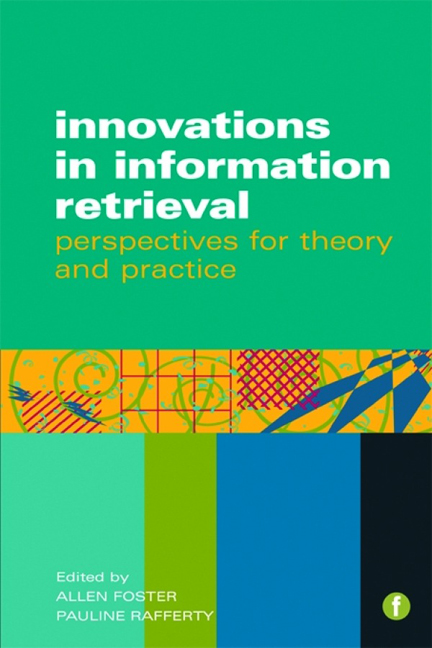Book contents
- Frontmatter
- Contents
- Figures and tables
- Contributors
- Foreword
- Introduction
- 1 Encountering on the road to Serendip? Browsing in new information environments
- 2 Classification revisited: a web of knowledge
- 3 Approaches to fiction retrieval research: from theory to practice?
- 4 Music information retrieval research
- 5 Folksonomies, social tagging and information retrieval
- 6 Digital information interaction as semantic navigation
- 7 Assessing web search engines: a webometric approach
- Index
7 - Assessing web search engines: a webometric approach
Published online by Cambridge University Press: 08 June 2018
- Frontmatter
- Contents
- Figures and tables
- Contributors
- Foreword
- Introduction
- 1 Encountering on the road to Serendip? Browsing in new information environments
- 2 Classification revisited: a web of knowledge
- 3 Approaches to fiction retrieval research: from theory to practice?
- 4 Music information retrieval research
- 5 Folksonomies, social tagging and information retrieval
- 6 Digital information interaction as semantic navigation
- 7 Assessing web search engines: a webometric approach
- Index
Summary
Introduction
Information Retrieval (IR) research typically evaluates search systems in terms of the standard precision, recall and F-measures to weight the relative importance of precision and recall (e.g. van Rijsbergen, 1979). All of these assess the extent to which the system returns good matches for a query. In contrast, webometric measures are designed specifically for web search engines and are designed to monitor changes in results over time and various aspects of the internal logic of the way in which search engine select the results to be returned. This chapter introduces a range of webometric measurements and illustrates them with case studies of Google, Bing and Yahoo! This is a very fertile area for simple and complex new investigations into search engine results.
The modern commercial web search engine is a highly complex system (Arasu et al., 2001) with vast social and commercial significance (Van Couvering, 2004, 2007). Although they can be evaluated to some extent with traditional IR measures like precision and recall, web search engines behave differently from traditional IR systems in many respects. Three key differences are the importance of rank order in the results; the limitation to 1,000 matches per query; and the goal of delivering relevant and useful results rather than technically accurate matches (in the sense of: Bar-Ilan and Peritz, 2008). In response, evaluation metrics have been developed to measure new characteristics of web search engines, such as the effectiveness of the rank order of the results (Zaragoza, Cambazoglu and Baeza-Yates, 2010), mean average precision (Turpin and Scholer, 2006) and discounted cumulative gain (Jarvelin and Kekalainen, 2002). A broad common goal is to assess the extent to which any web search engine delivers good and relevant results to users. For some information scientists, however, IR goals are not sufficient with regard to web search engines, for two reasons.
First, search engines like Google are so important in academia and daily life that it is important for information professionals to understand something of how they work and what their limitations are.
- Type
- Chapter
- Information
- Innovations in Information RetrievalPerspectives for theory and practice, pp. 135 - 146Publisher: FacetPrint publication year: 2011



